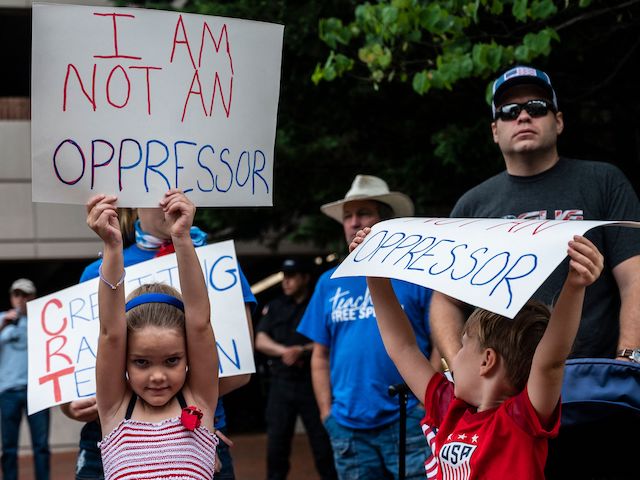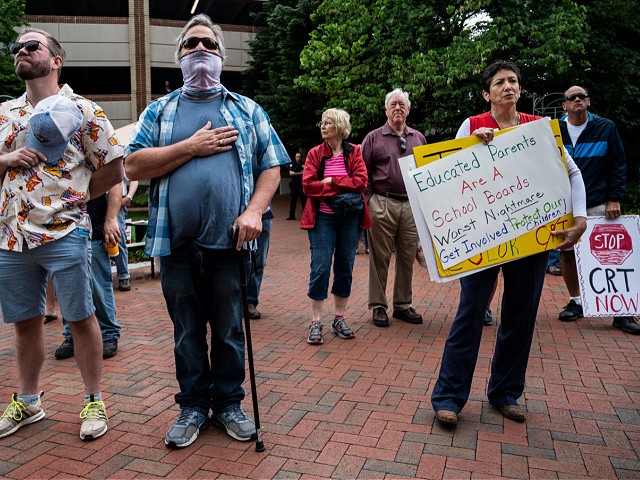A whistleblowing middle school teacher says she faces a “culture of intimidation” after being forbidden to teach — despite a shortage in teachers — due to her exposing her school district’s “radicalized” critical race theory (CRT) curriculum, which is manifest “absolutely everywhere” throughout the school’s culture as well as its reading materials. She warned it was causing “great harm and racial divide and hostility between children” and that the country will soon be unrecognizable if it is not stopped.
Ramona Bessinger, a Providence, Rhode Island, veteran English teacher described in July how her school district’s “radicalized curriculum” actually “created racial tensions among students and staff where none existed before.”
Joining Steve Malzberg on his Eat the Press weekly commentary show this past week, she said the school’s previous curriculum had “lots of diversity [and] lots of multicultural materials” as opposed to the new “radicalized” one, which sees CRT implicit throughout.
“We’re not teaching critical race theory. It’s implicit in the culture. It is implicit in all the reading materials. It is implicit in all the projects that the kids are doing,” she said.
“It is causing great harm and racial divide and hostility between children and it really has to stop,” she added.
While Bessinger agreed there was no official session dedicated to CRT education — which allows the school to deny it is being taught — she noted that the situation is even more dire, with CRT permeating the entire curriculum.
“It’s in the plot narratives; it’s in the characterization; it’s in the imagery,” she said. “It’s in the art projects, the history class, the English classes.”
“It is in the language that we are told to use in our professional development,” she added. “It is absolutely everywhere.”
She also described the drastic “shift” taking place which sees an entire overhaul of the school’s education materials.
“Just to speak to the fact that our libraries are being dismantled and books are being moved into archaic basement rooms around the school or flat-out thrown out,” she said. “So there’s a whole shift taking place and we really need to pay attention to this.”
Bessinger, who describes herself as “wanted by the Department of Justice for teaching children how to read, write and think for themselves,” denied the notion that opposition to CRT being taught in schools implied one did not wish true history to be taught in the classroom.
“I’ve been teaching for 23 years now and … I’ve never ever seen anybody who is a teacher and kind and compassionate, teaching anything other than the entire truth — our entire diverse multicultural history,” she said, adding that the previous curriculum materials were “filled with all kinds of diverse materials.”
“So to suggest that we were not teaching a diverse curriculum is a lie, a flat out lie,” she added.
She also described her experience after having protested the new materials.
“It was sometime last January I noticed that the books and textbooks and materials were all like, I couldn’t recognize them,” she said. “I noticed also that huge chunks of our curriculum materials were removed, like the Holocaust for example — we were no longer teaching the Holocaust — so there was cause for alarm early on.”
“By the end of the school year I decided I had to write about this and tell the story because to erase our past, to eliminate our past — I could see a pattern occurring that somehow our culture and our history and our narrative as Americans was changing and that alarmed me and scared me,” she added.

People hold up signs during a rally against “critical race theory” (CRT) being taught in schools at the Loudoun County Government center in Leesburg, Virginia, on June 12, 2021. (Photo by ANDREW CABALLERO-REYNOLDS/AFP via Getty Images)
Following her return to school after writing about the issue, Bessinger described the “intimidation” and “bullying” she encountered as a result of speaking out:
When I returned back to school in September several of my colleagues were quite hostile towards me, not everyone — many people reached out to me in private in support — but you have to understand there’s a culture of intimidation, bullying and harassment if you dare speak out against this regime or against this network of educators coming from the federal government on down.
When the intimidation didn’t work, Bessinger claimed critics of hers “upped the ante” by involving school children in the matter.
“Once they turn children against you and kids start believing this narrative that you are somehow racist, then it’s over,” she said.
“And that was probably the moment in time when I wrote to my administration to say there’s a great deal of hostility occurring at my school,” she added, “and rather than mitigate the situation they moved me to another location and basically removed me from all my teaching duties.”
Bessinger then detailed the repercussions educators who speak out against CRT undergo.
“I’m being paid for not teaching while there’s a teaching shortage,” she said.
“And as an expert being a reading and writing teacher, I think it’s important that the taxpayers need to know that this is happening to anyone who goes against this regime or this whole sort of political agenda,” she added.
Stating her refusal to resign as a result, she described the importance of doing what’s right and letting the world know the truth of what’s occurring in schools.
“I’m going to stay and do what I feel is right for my own children, for the students, and ultimately for the country,” she said. “Because what is happening currently is wrong and it needs to be exposed and the world needs to know.”
Bessinger concluded by warning that the country would be unrecognizable if schools continue to change from within without any resistance.
“I’m going to fight this,” she said. “Yes, I’m not going to allow them to win.”
“Because if they do win … I don’t believe we’re going to recognize our country if this is allowed to take place because the culture is changing from within our schools and it’s changing rapidly.”
The battle over CRT in schools has resulted in nationwide tension in recent months.

People hold up signs during a rally against “critical race theory” (CRT) being taught in schools at the Loudoun County Government center in Leesburg, Virginia, on June 12, 2021. (Photo by ANDREW CABALLERO-REYNOLDS/AFP via Getty Images)
The theory, which is promoted by many on the left, claims that American institutions — the government, economy, and culture — are based on racial hierarchy and aim at maintaining the dominance of white people, and even that which appears race-neutral is, on closer inspection, rooted in racism.
As a result, it urges reform in virtually all of the country’s institutions.
The theory’s architects have argued that the U.S. was founded on theft of land and labor, with federal law maintaining the unequal treatment of citizens by their race.
CRT advocates have also expressed the belief that race is culturally invented, not biological.
Last week, Professor Kimberlé Crenshaw, a CRT co-founder, called for youth to “understand the ground upon which we stand is ground that’s soaked in blood of theft,” while warning of the outcome if the “other side gets its way,” declaring “the road to authoritarianism will be paved through white supremacy.”
Earlier this month, a Science, Technology, Engineering, Math (STEM) educator and administrator in the largest school district in Indiana addressed parents in a video in which he asserted when school officials say they are not teaching CRT, “we’re lying.”
In June, a former Democrat congressional candidate called on Americans to listen to black parents who oppose CRT “indoctrination” in schools, while calling on black Americans to reject the Democrat Party’s race narrative and, instead, realize “that their skin color is not a barrier to their progress,” adding that Democrats use race to galvanize black electorate support though many black Americans actually “have conservative ideals.”
Follow Joshua Klein on Twitter @JoshuaKlein.

COMMENTS
Please let us know if you're having issues with commenting.